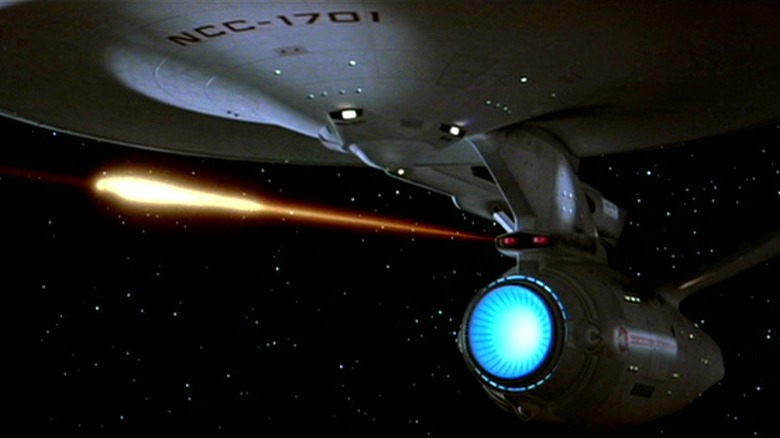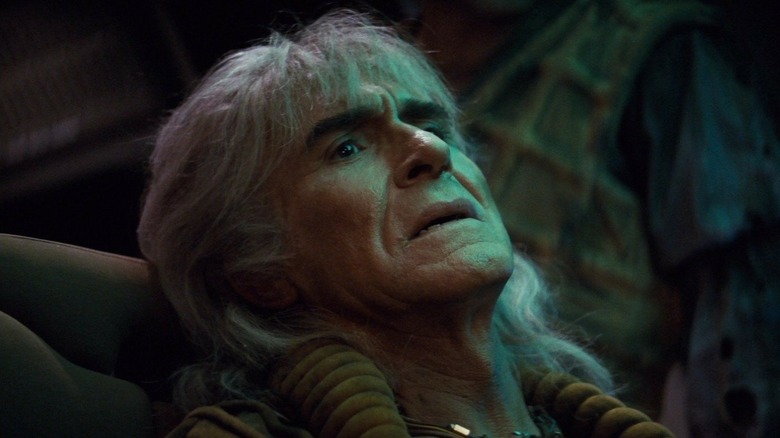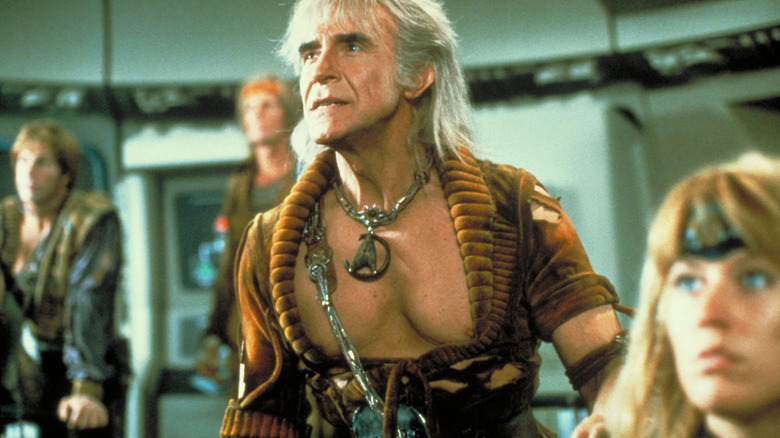The One Redeeming Quality Gene Roddenberry Saw In Star Trek II: The Wrath Of Khan
It's pretty well known among Trekkies that Robert Wise's 1979 feature film "Star Trek: The Motion Picture" came about after the proposed 1977 TV series "Star Trek: Phase II" never quite made it off the ground. "Phase II" was meant to be the initial "Star Trek" spinoff series, but various behind-the-scenes decisions eventually saw the project mutating to fit the big screen. "Phase II" characters were changed to be part of "The Motion Picture," and several ideas for "Phase II" scripts made their way into future episodes of "Star Trek: The Next Generation," which debuted in 1987.
Trekkies will also tell you that Paramount was unimpressed by the box office numbers for "Motion Picture," a film that "Star Trek" creator Gene Roddenberry was heavily involved in. Harold Livingston is the credited screenwriter, but Roddenberry aided in the story and served as producer. Because "Motion Picture" was a relative dud, Roddenberry was pushed out of the sequel. According to the unofficial 2012 book "Star Trek: The Complete Unauthorized History" by Robert Greenberger, only about 20 percent of what Roddenberry initially conceived of for a "Motion Picture" sequel was used in the eventual final version, called "Star Trek II: The Wrath of Khan," released in 1982.
"The Wrath of Khan" was a huge hit, and is often considered by Trekkies to be the best of all the Trek movies. Roddenberry, perhaps predictably, didn't feel the same way. According to the book "Captains' Logs: The Unauthorized Complete Trek Voyages," edited by Mark A. Altman and Edward Gross, Roddenberry felt "Khan" to be a corny action film lacking in quieter moments of peace and enlightenment. He liked the film's action and exciting filmmaking (from director Nicholas Meyer), but felt that Ricardo Montalbán's amazing performance as Khan was the film's only redeeming quality.
Montalbán saved their butts
The story of "Wrath of Khan," as many know, caught up with the abandoned villain Khan, left on the planet Ceti Alpha V after the events of the original series episode "Space Seed" (February 16, 1967). The planet suffered an environmental cataclysm in the interim, leaving Khan and his retinue stranded on a dying desert world. Upset that Kirk (William Shatner) never bothered to check up on him, Khan steals a Federation starship using unusual brain-manipulating earworms to control Starfleet officers. He sets about on a mission of revenge.
Revenge stories are fine fodder for action films, but Roddenberry didn't want "Star Trek II" to be an action film. Like "Star Trek: The Motion Picture," he would have preferred something headier and more based on sci-fi ideas. Roddenberry hated the final script for "Khan," feeling the dialogue to be cheesy. He was quoted as saying:
"I think it was an exciting picture. [...] I had many problems with it, though. I thought they were very lucky they had the actor they did in Ricardo Montalbán to play Khan since it was not a well-written part. 'I will chase you through the moons of Jupiter' and so on, in the hands of almost any other actor would have gotten snickers from the audience. Montalbán saved their ass. Khan was not written as an exciting character, he was rather flimsy. The Khan in the TV episode was a much deeper and better character than the movie Khan, except that Montalbán pulled it off."
Khan's line was actually "I'll chase him round the moons of Nibia and 'round the Antares maelstrom and 'round perdition's flames before I give him up," but one can see Roddenberry's point.
Khan the Khorny
Roddenberry's objections come from a fundamental clash between what he wanted "Star Trek" to thematically underline, and what action movies typically tend to communicate. Action movies are typically predicated on cathartic violence, often depicting murder and destruction as heroic acts. They also tend to take place in morally absolute universes wherein a "hero" can kill a "villain" without any moral repercussions. "Star Trek," at least by Roddenberry's vision, wasn't meant to take place in that type of universe. He preferred stories wherein characters were enlightened and calm, devoted to diplomacy and science.
In "Khan," when Kirk saw a monstrous brain eel, his first instinct was to kill it. This, by Roddenberry's estimation, was antithetical to the spirit of "Trek." He continued:
"I ... objected to other little things. Remember when the eel came out of Chekov's ear? What did Kirk do? He had a look of disgust on his face and grabbed his phaser and went 'zap.' How dare he destroy a life form that had never been seen before? It needed studying. They had him act like an old woman trampling on a tarantula. Now that's not the Kirk we built up for three years. So many of those fine little things in the episodes, hundreds of them, are what gave 'Star Trek' its quality. Unfortunately, they began doing those things incorrectly in that movie."
Roddenberry also noted that "There was also a great deal of violence." He felt that "Khan" was incredibly well-made, and that it was certainly exciting to watch — no one is denying that claim — but that it fell into the usual traps of action movies that he found distasteful. Recall that "Star Trek" is at its best when it's not trying to lean into action.


